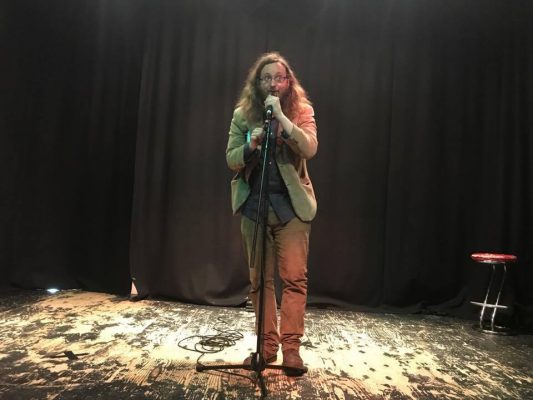Spark London: Brits with Tales to Tell
Dave Pickering warmly welcomed everyone to the Spark London event on Monday, June 12. (ERIKA ORTIZ/THE OBSERVER)
June 25, 2017
Before I left for my month-long study in London, I met up with an Anglophile friend of mine to ask for her advice. She had visited England several times, so I wanted to pick her brain not only about places to go and things to do, but about what she saw as the major differences between the British and Americans. Her main cultural insight was about how the British deal with intense emotion: they don’t. “The level to which they repress their emotions, the severity of isolation they experience, is beyond anything I’ve ever seen in the States.”
With Britain’s reputation of being reserved to a fault, I was curious about how they could get up on stage and share personal stories with a room full of strangers—yet that’s exactly what Spark London has been doing since 2007. In the last 10 years, they’ve managed to build an open, accepting and emotionally in-touch community in a society that allegedly lacks such spaces.
The theme of the Spark London event I attended on Monday, June 12, was “Adulthood and Age.” Before the storytelling officially began, Dave Pickering, the emcee for the evening, stepped onstage to address the crowd. Going over the rules for the performance, he stressed the importance of showing intense support and enthusiasm for each and every performer, as “we never know if it’s their first time.” The crowd showed their eagerness to comply by clapping enthusiastically when the first storyteller’s name was called—though it took several seconds for them to realize that the name Pickering had called was his own.
Over the course of the evening, 12 people told stories, their own personal experiences of adulthood and growing up. Sad, funny and everything in between, the performers that night openly shared personal parts of themselves. Were many of these stories unrehearsed, unpolished? Absolutely. But in that space, it didn’t seem to matter. From Fajah’s story about grappling with turning 30 and her grandmother’s death, to Carl’s tale about childhood awkwardness and appreciating the music of life, each person put themselves and their experiences out into the open, and they were met with nothing but respect and appreciation.
During a scheduled break between performances, I sat down at a table with Ross Norman and MacKenzie Common, two people who had shared their stories earlier that evening, to try and get a sense of what Spark London does for them. For Norman, who is British-born, Spark events allow him to have a voice in an open and welcoming atmosphere. “It’s just a chance to tell stories, and there’s so much love and approval in this room,” Norman said. “I think that’s something that this society could do with a lot more of.”
For Common, a Canadian native currently working towards her PhD in London, attending Spark events is her attempt at finding something to be a part of. “I’ve lived here for a few years now, but for some reason, in the last month I realized that I have no community here,” said Common. “I didn’t know how to be a part of something bigger in London.”
Common’s struggle to find a community was likely hindered by the rumored British aversion to self-revelation. It goes against the grain for British people to strike up conversations with strangers, and the British people seem painfully aware of their society’s social boundaries. Even as people began filtering into the Hackney Attic before the Spark event began, Pickering kindly asked strangers to sit with each other for the sake of filling the space effectively, as there were more than 100 people in attendance. He somewhat-jokingly commented, “I know it’s very un-British to sit at a table with some other people who you don’t know… but you don’t even have to talk to them.”
Norman’s observations echoed Pickering’s. “Being sociable in public settings is so out of character for British people,” he said. “We don’t like our social faux pas. We tend to keep it all above board.” Additionally, Common noted that the nature of Americans, compared to British people, is not so closed-off and careful. “Americans are more self-confident, I think. They’re more optimistic and less afraid of being made fun of, and that’s why they end up at these events a lot.”
Maybe that optimistic self-confidence was part of the reason why Callan McCarthy, Fordham College at Rose Hill (FCRH) ’18, decided to get up on stage and tell her own story about adulthood. Though she sees adulthood as a process rather than a status one is granted, at 20, she was still nervous about how her story would be received. “I think I was the youngest storyteller. What did I have to say about adulthood that was different or unique? Despite that, everyone listened and made me feel proud of what I had to say, even if I wasn’t older and wiser.” Even though the experience was anxiety-provoking, McCarthy felt comfortable amongst that community: “It was such a safe space… It was okay to be vulnerable, and okay to be honest. I love that.”
As Dave Pickering had explained during the evening’s introduction, “Stories spark stories in other people.” As I meandered towards the exit, I watched the night’s performers crowd together near the stage, congratulating each other and talking animatedly about the stories they’d heard and the stories they’d told, sharing pieces of their lives that couldn’t be contained in just five minutes.
When stories spark stories, they also spark connections. For a society that is often so reserved, blanketed by stoicism, there could be no greater gift.










